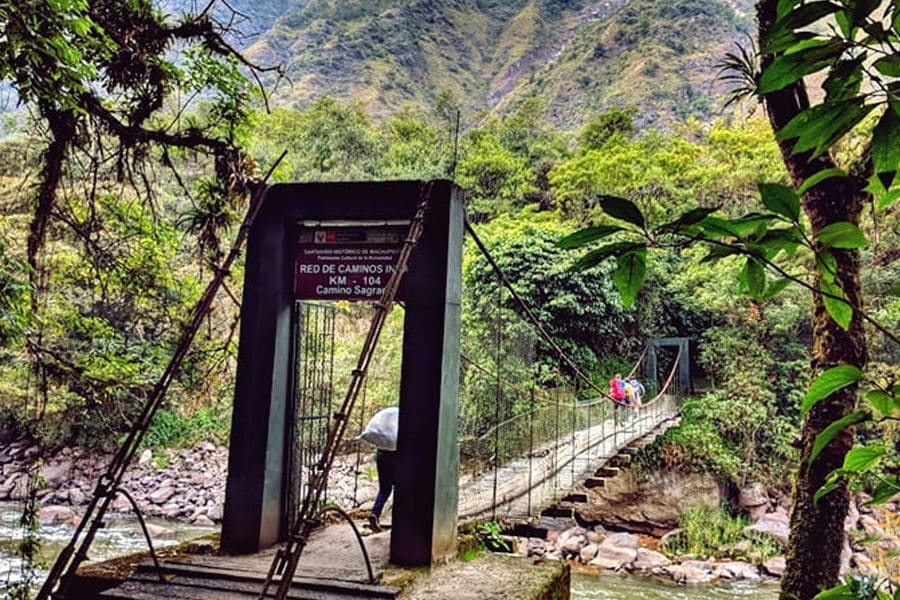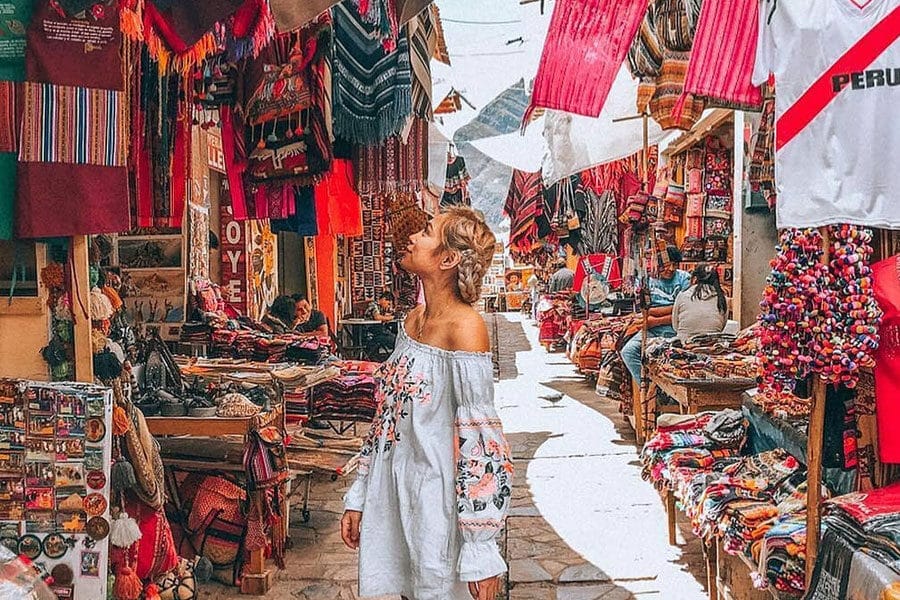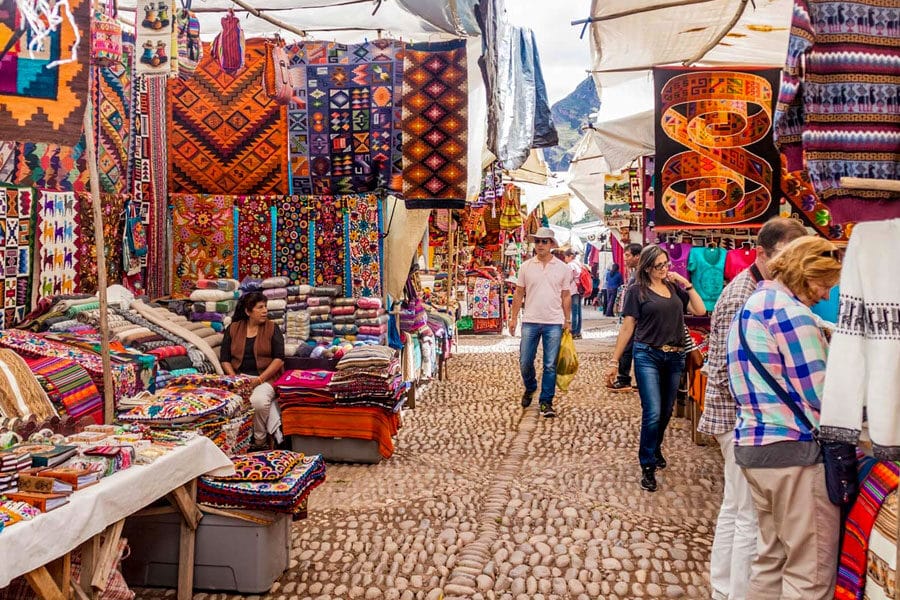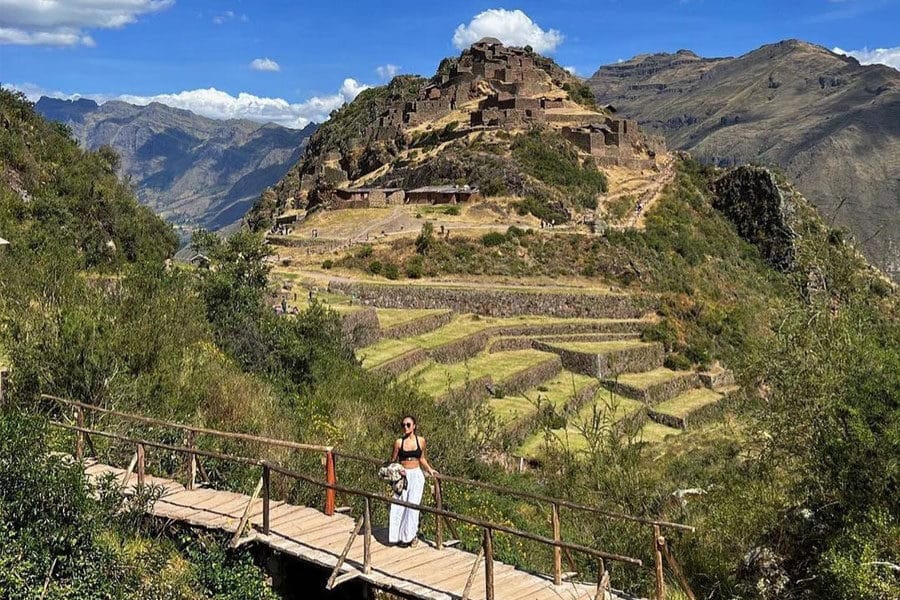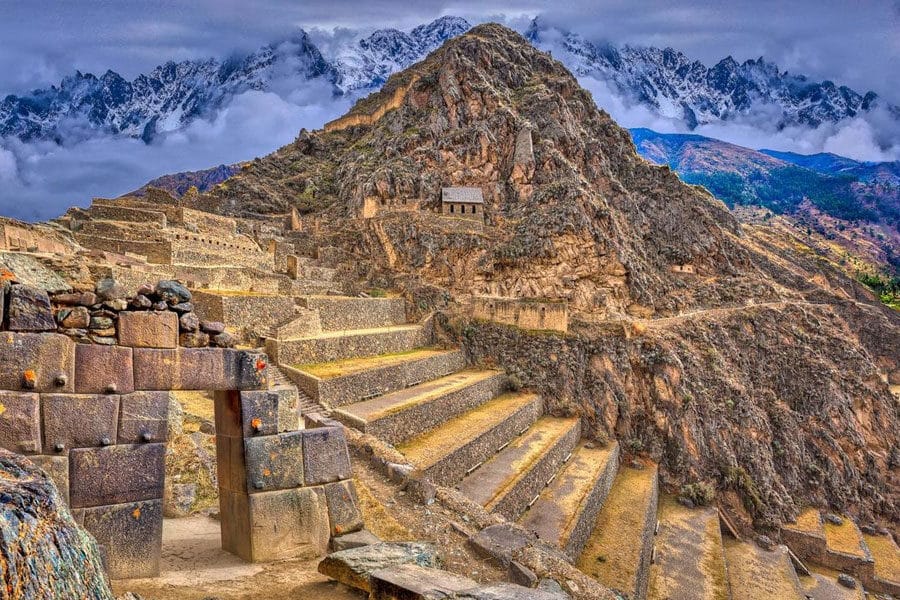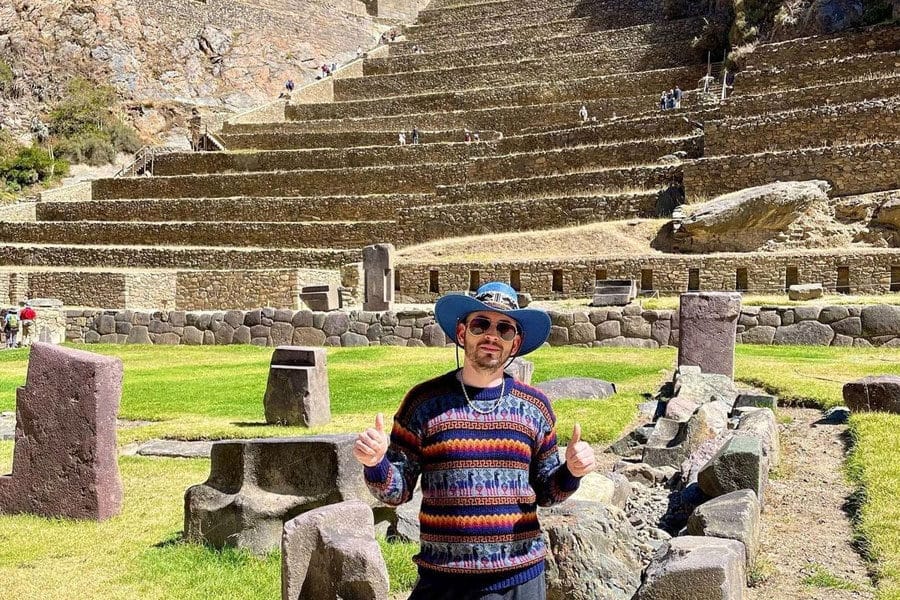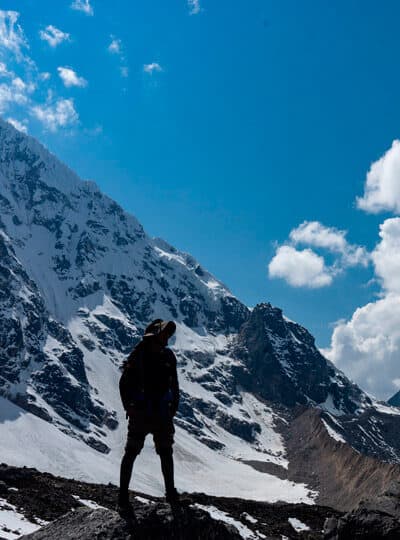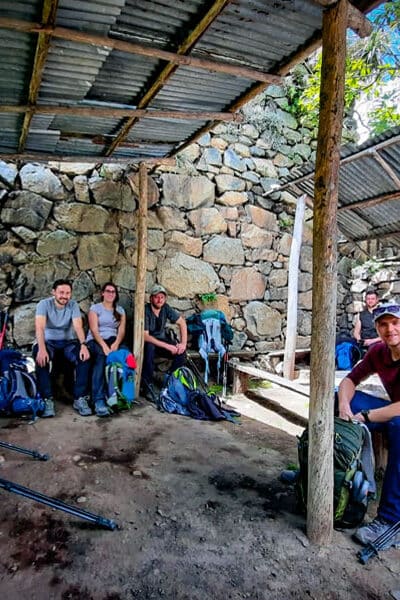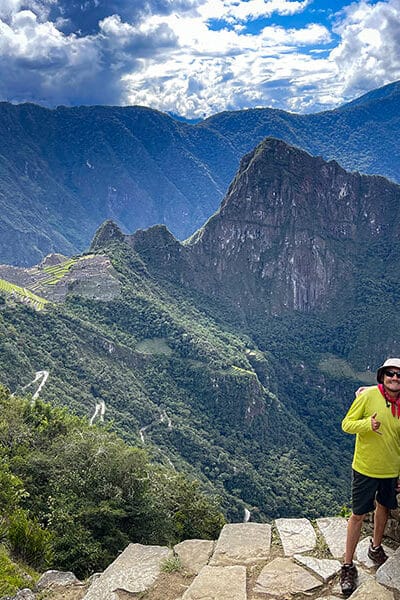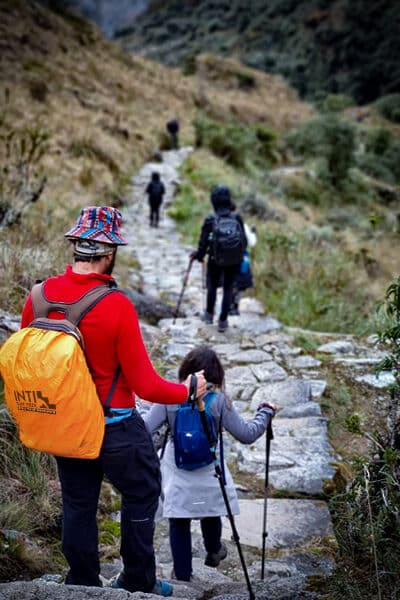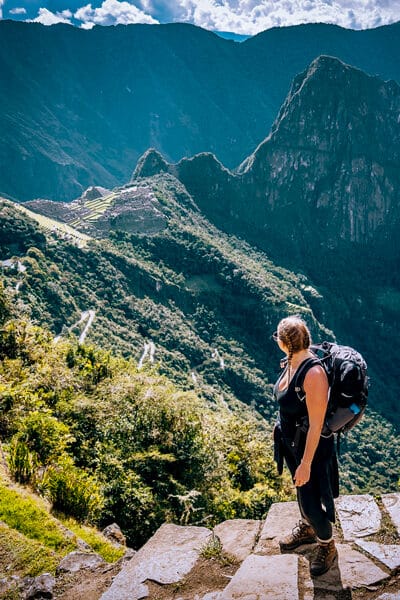Summary Sacred Valley tour Short Inca Trail 3 days / 2 nights – This tour combines the beauty of the Sacred Valley of the Incas with the Inca Trail to Machu Picchu in 3 unforgettable days. Being the best alternative for people who do not have much time, families with small children, people who are not used to hiking and do not like to camp. This option will also allow you to enjoy Machu Picchu on two occasions: The first at sunset on the second day and the other at dawn on the third day.
This tour includes accommodation at a hotel in Aguas Calientes, which is lower in elevation than the Machu Picchu complex and in such a remote area that it may only be reached by train. The short Inca Trail trek to Machu Picchu is not very challenging, which makes it perfect for families with children and travelers on a tight time schedule. However, we still recommend that you be well prepared, moderately fit, and healthy prior to starting the trek. To prepare, try walking 10km a day or start going to the gym a month before the trek.
Please note that Inti Sun Trek will provide a delicious boxed lunch (2 kg/4 lbs) for the first day of this tour, which you will have to carry in your daypack—be sure to leave a little extra space!
Peru
Sacred Valley Tour & Short Inca Trail to Machu Picchu 3Days / 2Nights
Summary
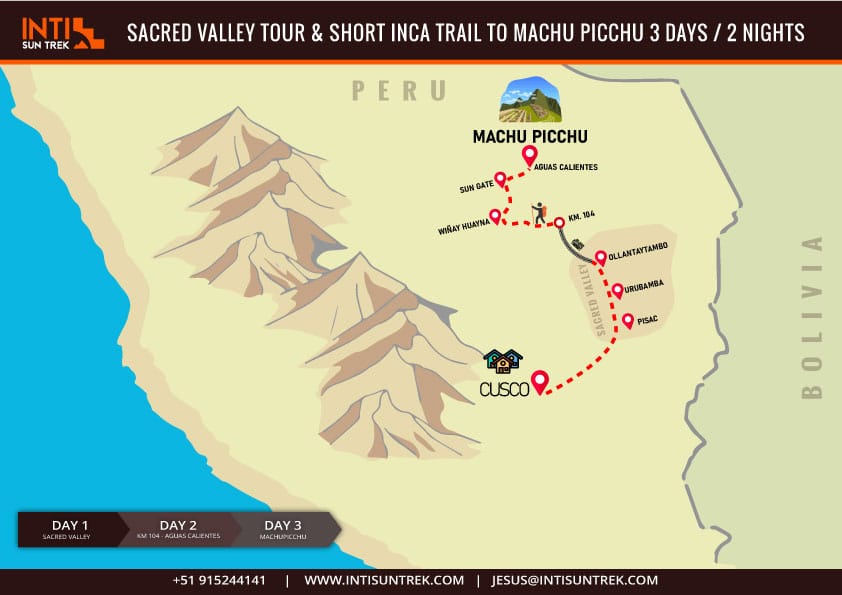
Overview Sacred Valley Tour Short Inca Trail
Day 1:
Cusco — Sacred Valley — Pisac — Urubamba — Ollantaytambo
On the first morning of the tour, we will meet at the Inka Trail office at 8:30 a.m. or pick you up from your hotel at an earlier time. In a tourist bus, we will travel from Cusco past Saqsaywaman & Tambomachay, over the mountains toward the Sacred Valley
- Tour Start Time: Approximately 8:00 or 8:30 am
- Arrival in Ollantaytambo: Approximately 6:30 pm
- Difficulty: Light
- Weather: Warm and sunny, with cooler temperatures at night
- Accommodation: Janakpata Hostel or comparable hostel
Day 2:
Ollantaytambo — Km 104 — Aguas Calientes
We will pick you up early from your hotel at approximately 5:40 a.m. (depending on the train schedule) and take you to the train station. We will travel by train on a very picturesque route for an hour and a half to kilometer 104 – our starting point for the 2 Day Inca Trail Hike.
- Walking distance: Approximately 8 miles / 13 kilometers (six to seven hours)
- Maximum altitude: 2,650 meters / 8,692 feet above sea level
- Difficulty: Moderate to challenging
- Weather : Warm and windy
Day 3:
Machu Picchu Tour — Return To Cusco
- Machupicchu elevation: 2400meters/7873ft
- Difficulty: Easy
- Weather: warm
New Regulations
- The new regulations of the Peruvian government regarding the Inca Trail indicate that the guided tour in Machu Picchu after your arrival at the Inca citadel will follow circuit number 3. Therefore, we recommend that you make the most of the opportunity to take all your photographs once you begin the descent from the Sun Gate and reach the viewpoint, where they will take the classic photograph of the entire Inca citadel. See the article about the Inca Trail and its new circuit to visit Machu Picchu.
Itinerary
Day 1: Cusco — Sacred Valley Tour — Pisac — Urubamba — Ollantaytambo
Highlight of the day: Learning a lot about the Inca empire and understanding more about the different sites.
On the first morning of the Sacred Valley tour, we will meet at the Inka Trail office at 8:30 a.m. or pick you up from your hotel at an earlier time. In a tourist bus, we will travel from Cusco past Saqsaywaman & Tambomachay, over the mountains toward the Sacred Valley. We will descend 1500 feet to the floor of the Urubamba river valley, arriving in the village of Pisac for a visit to its famous craft market. Located 33 kilometers from Cusco, the village of Pisac sits below one of the region’s most important archeological sites, where you will be able to explore an ancient Inca agricultural center and its stunning terraces. On the guided walk through the Pisac citadel, you will be able to observe temples, residences, altars, channels, carvings, tunnels/caves and the famous Intihuatana, which means “the hitching post of the sun.” For those who would prefer to spend more time in the market instead of visiting the ruins, let your guide know so he can organise a time and place to pick you up when returning through the market.
We will continue on to Urubamba where you can stop to buy a traditional lunch in the shadow of snow-capped Chicon Mountain and explore the lush, palm-filled Plaza de Armas before continuing with the afternoon portion of the tour. After another thirty minutes in the car, we will arrive in the town of Ollantaytambo, where villagers still live in ancient stone houses built by the Incas. In Ollantaytambo, you will see the amazing temple of the Sun, stone water fountains, stairs, terraces and the beauty of the local people in their traditional dress, all surrounded by the mountains and the valleys of Patacancha and Willoq. In the evening, you will check into your hotel in Ollantaytambo and have dinner on your own in one of the many great restaurants near the center of town.
- Tour Start Time: Approximately 8:00 or 8:30 am
- Arrival in Ollantaytambo: Approximately 6:30 pm
- Difficulty: Light
- Weather: Warm and sunny, with cooler temperatures at night
- Accommodation: Janakpata Hostel or comparable hostel

Day 2: Ollantaytambo — Km 104 —MachuPicchu — Aguas Calientes
Highlight of the day: Explore archaeological sites and take in the stunning Andean landscapes.
The Short Inca Trail tour begins by picking you up early from your hotel approximately from 5:40 a.m. to 6:00 a.m (depending on the train schedule) and take you to the train station. We will travel by train on a very picturesque route for an hour and a half to kilometer 104 – our starting point for the 2 Day Inca Trail Hike. From here, we will walk for approximately four hours up to the Inca site of Wiñay Wayna, which means “forever young” and is located at 2,680m/8,792ft. Many consider this to be the most impressive site on the Inca Trail.
We will then continue hiking to Inti Punku, the “Sun Gate”, at an elevation of 2,730m/8,956ft. From the Sun Gate, you will have your first dramatic, panoramic view of Machu Picchu below you at (2,400m/7,873ft). We will walk down the last part of the trail towards the ancient city. Before reaching Machu Picchu, we will be able to celebrate our accomplishment and take unforgettable pictures in the classic spot. We will descend to the main entrance, where you will take the bus to the town of Aguas Calientes where you will have dinner and spend the night. We will tour Machu Picchu early the next day.
- Walking distance: Approximately 8 miles / 13 kilometers (six to seven hours)
- Maximum altitude: 2,650 meters / 8,692 feet above sea level
- Difficulty: Moderate to challenging
- Weather : Warm and windy

Day 3: Walking Tour in Machu Picchu — Return To Cusco
Highlight of the day: Exploring the amazing Machu Picchu and learning all of its secrets.
After breakfast, our guide will pick you up from your hotel and accompany you to the bus station, where you will board a bus to return to Machu Picchu, where you will witness the magnificent sunrise at this ancient Inca city. According to the new Inca Trail regulations, we will re-enter Machu Picchu using circuit number 3
Once inside the Inca citadel, you will enjoy a guided tour of approximately two hours, exploring the most relevant sectors of this incredible ancient site. You’ll see houses, temples, terraces, and crop fields, among other features. The ingenuity of the Incas in terms of engineering work, which was far ahead of its time, remains a mystery in many aspects.
After your tour, you can choose to ascend Huayna Picchu Mountain (2,720 m / 8,924 ft) or Machu Picchu Mountain (3,000 m / 9,843 ft) These tours will take you approximately one and a half and three hours, respectively, for both ascent and descent (tickets must be booked in advance).
Ensure you return to Aguas Calientes for lunch before boarding your train to Ollantaytambo, which departs at around 18:20 (subject to availability). Our private transportation will collect you from the next station and drive you back to your hotel in Cusco at around 10 pm. Now you can put your feet up and enjoy some much-needed rest, but your heart will continue to beat to the rhythm of the Andes for many weeks, months, and years to come!
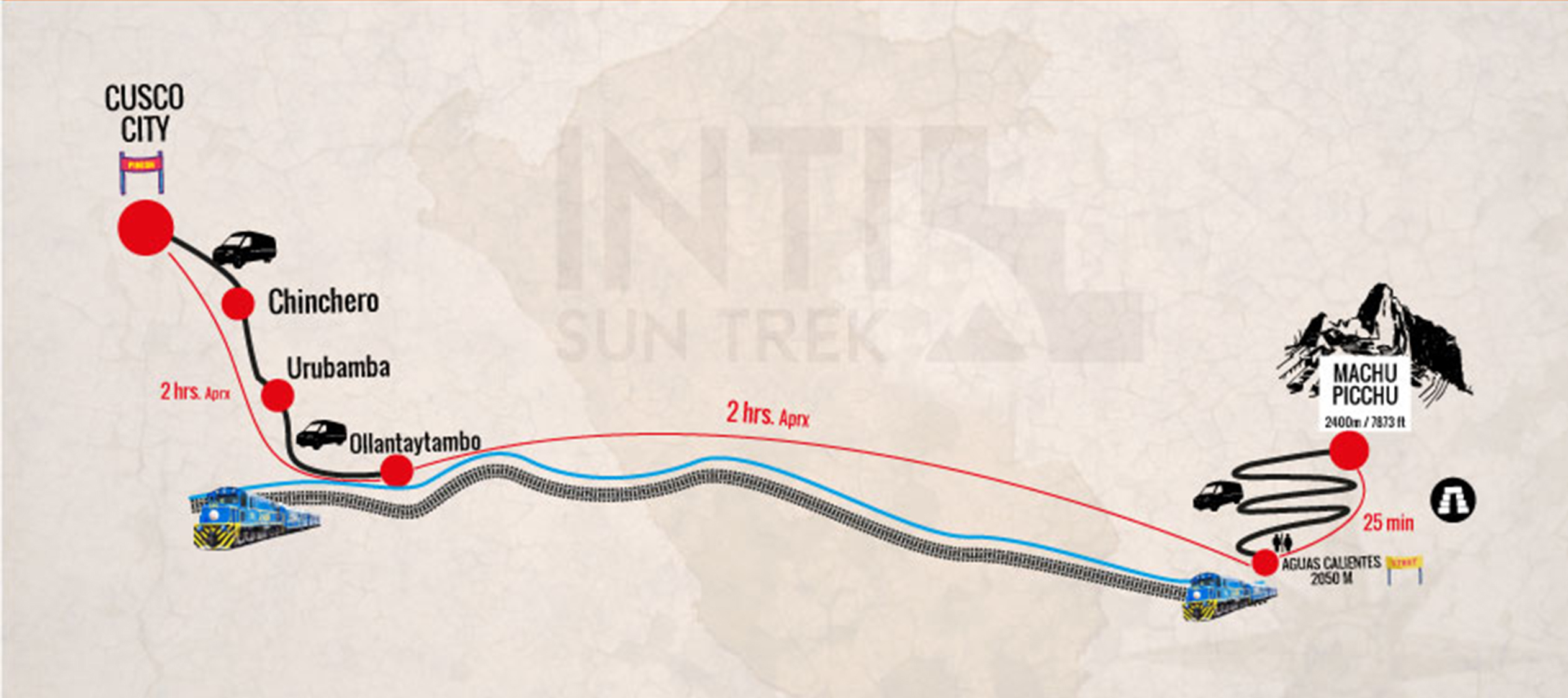
Price
US $540 per person
After we have received your booking form and confirmation your deposit was made, we will send you an electronic receipt confirming your trek has been officially booked and the exact departure date of your trek.
Discounts
- Student Discount $20
- Under 18 Discount $20
- Under 7 Discount $50
Important Notice Regarding Student Discount Eligibility
We offer a student discount (USD $20.00). However, due to several incidents of users falsifying personal data, the ISIC card is no longer valid for purchasing a discounted tour. As of July 1, 2017, the rules for purchasing student tickets to Machu Picchu have changed: discounts are only available with presentation of a student visa granted by the Peruvian embassy or consulate in the student’s country of origin and/or by the National Superintendent of Migrations. These documents must be provided at the time of purchase; discounts cannot be applied retroactively and refunds or reimbursements, in this case, are not available. Please send us a scan or photocopy of your passport, student visa, and university ID card or transcript so that we are able to secure your discount
For more information, please visit the following link: http://www.machupicchu.gob.pe/items/estudiantes.html
WE RESERVE THE RIGHT TO COLLABORATION
In case we do not meet the minimum group size or we do not have enough people to operate the tour ourselves, we reserve the right to occasionally collaborate with other tour operators. In these cases, the client will always be notified in advance
Additional Options
Huayna Picchu
Huayna Picchu is the mountain that stands next to Machu Picchu and can be seen in most photos of the ruins. It is a 45-minute hike to the top. While this hike is done on your own, your guide will direct you to where this hike begins. This requires a separate entrance ticket that we can secure for you with advance notice, for an additional $80 per person.
Machu Picchu Mountain
Machu Picchu Mountain is the other mountain that stands above the Machu Picchu ruins. It offers even more stunning views than Huayna Picchu, but takes an hour and a half of steep climbing to reach the top. This also requires a separate entrance ticket that we can secure for you with advance notice, for an additional $80 per person.
Returning train Included in the cost of this tour/trek is the Expedition train, which departs either at 6:20 pm or 7:00 pm and 8:20 p.m. DEPENDING ON AVAILABILITY.
Can I get an early train ticket?
We can also book an afternoon train that departs 2:55 p.m. or 4:22 p.m. at an extra cost of US $35 per person the train we will book DEPENDS ON AVAILABILITY.
Please, notice that 35 dollars extra you will pay also will cover your private transportation to bring you back from Ollantaytambo train station to your hotel in Cusco
There is also an option to upgrade your train to the Vistadome train which is the extra US $75 per person. Please let us know your preference at the time of booking the tour. Unfortunately, none of the trains go straight to Cusco—they run either to Ollantaytambo or Poroy. In either case, we will transfer you back by bus to Cusco.
Can I change my return train ticket by myself?
At the time of your tour, it may be possible to make changes to your return train ticket if you don’t want to take the 18:20 p.m train. You will have to take your train ticket personally to the train station in Aguas Calientes and ask them to change the return ticket for an early one. You will probably be asked to pay an extra administration fee, which will depend on the train service and departure time. Please notice that once you will change your returning train you will responsible to cover your own transportation back to Cusco
How long is the journey back to Cusco?
You will be traveling for approximately 3 hours before you arrive back in Cusco. First, you will travel for 1.5 hours by train to the Ollantaytambo train station. Then you will be picked up by your driver outside of the train station. The driver will be holding a sign with your name on it so that there will be no confusion. If you do not see the driver initially, wait for them outside of the train station. Once the driver has picked you up, you will travel for another 1.5 hours in a private van/car to your hotel/hostel in Cusco. Arrival time in Cusco will depend on train availability. You will receive your return train tickets once your guide has finished your walking tour of Machu Picchu.
Inclusions
Whats is Included for the Sacred Valley tour Short Inca Trail?
For the Sacred Valley Tour
- Transfer from your hotel/hostal
- Tourist Van for the Sacred Valley Tour (this will be a large group tour of 20 people )
- Lunch on the Sacred Valley Tour
- Professional guide who is fluent in English
For the Short Inca Trail to Machu Picchu
- Basic Hotel in Ollantaytambo (upgrades available)
- Transport by train to trailhead (104 Km)
- Lunch and dinner on the second day
- Machu Picchu entrance fee
- Walking tour in Machupicchu
- Bus tickets Machu Picchu / Aguas Calientes / Machu Picchu
- Basic Hotel in Aguas Calientes (includes breakfast)
- Tourist train from Aguas Calientes to Ollantaytambo or Cusco
- Transportation back from Ollantaytambo to Cusco
NOT INCLUDED
- Particial Tourist Ticket to visit all the place in the Sacred Valley tour ( 70 soles per person)
- Breakfast on the first morning
- Lunch in Aguas Calientes on the final day
- Entrance to the thermal springs in Aguas Calientes (optional: 20 soles)
- Tips for the guide
- Entrance to Huayna Picchu or Machu Picchu Mountain
What to Bring
WHAT YOU NEED TO BRING
- Original passport
- Hiking boots
- Waterproof jacket or rain poncho
- Two t-shirts
- Hand sanitizer
- Comfortable trousers
- Hat
- Sunscreen
- Insect repellent
- We strongly recommend to bring your Camel Back and water canteen due to that government of Peru will not allow disposable plastic bottles anymore on the Inca trail and in Machu Picchu.
- Toiletries
- Medication
- Toilet paper
- Camera, extra batteries, and extra memory cards
- Shorts
- Walking stick
- Bandages
- Sandals
- Extra money in small denominations of Peruvian soles
- Bathing suit for hot springs in Aguas Calientes town
Before you go
Pre-Trek Briefing
All briefings are done at our office at 6:00 PM the night before your trek. If you are unable to make this time, you need to coordinate another time with a member of the Inti Sun Trek office team. Briefings are approximately 30 -45 minutes long.
Renewal or change passport number?
If you plan to renew or change your name on your passport between making your trek booking and starting your trek, you can book your trek or tour with your current passport number or name, but you must send us a copy of your old passport and a copy of your new passport when you have them. We can then make the change with the government before you arrive. The extra cost to make the change is US$25 per person. (This will cover the change in number or name for your Inca Trail Permit, Machu Picchu Entrance, and train.)
If you do not advise us of the change or do not want to pay the fee, bring the original of both passports (the old and new one). You can enter Peru with your new passport but you must show the government authorities your old passport in order to enter the Inca Trail, Machu Picchu or train. If you cannot do so, you will not be allowed to start your trek by the government officials. All names and numbers must match!!
PICKUPS
Inti Sun Trek is one of the only companies to pick you up directly from your hotel. As long as your hotel is in the center of Cusco city,we will coordinate this pickup based on a time that your guide will discuss at the briefing. Pick up times may vary 30 – 45 minutes based on traffic conditions and previous pickups.
Cusco is an old city with cobblestoned streets and very narrow passageways. Very small hotels and Air BNBs are often located on streets that cars can not pass through. They also are often located up on the hillside, with long steep climbs to the property, difficult to maneuver with luggage. We highly recommend that you do not stay at one of these places.
Hiking in the Andes
Is something that everyone can do no matter their age, but it is never easy. You will need some level of fitness to be able to complete it comfortably. Each trial involves inclines that can take your breath away if you are not in shape and downhill hiking that can be tough on one’s knees. Walking sticks are recommended for everyone. Please remember the group treks are open to everyone, all abilities, so be patient and help those struggling with some kind words.
Getting to Cusco
The airport in Cusco is currently only for domestic flights, so all international travelers who arrive by plane must disembark in Lima and go through Customs. Even if your flight to Cusco is the same day by the same airline carrier, you must grab your bags in Lima and then check them back in.
The best way to get to Cusco is by air and there are several options in airlines. LATAM tends to be the most expensive but has the most options and flights.
Expect delays or flight cancellations. Due to the high altitude of Cusco, it tends to be difficult to land and any acclimate weather will stop air traffic. Bus travel is always available and while the trip can be long, especially from Lima, the buses in Peru are very well maintained and comfortable. This option is strongly encouraged if coming from a city closer to Cusco, like Puno. Lima buses will take about 20 hours to arrive.
Storage during your trek to Machu Picchu
Most of our trekkers leave their belongings that they do not want to bring on the trek in the hostel they were previously staying in. These hostels/hotels usually have a secure, locked room where you can securely store your belongings. If you do not trust your hostel, we would be more than happy to store your belongings for you in our office. Make sure your bags have some kind of identification on them so they are easy to locate.
Your Safety is our first concern
Trekking the Andes is not your typical vacation. And most of the people who hike with us have little to no experience with hiking in altitude. We understand the large responsibility we have in ensuring that you are well taken care of every step of the way.
First Aid
Each year, Inti Sun Trek guides receive training in first aid from a physician. We conduct mandatory training every February to which every single guide attends. When guiding you, they will have with them a first aid kit for basic medical problems (traveler’s diarrhea, cuts/scrapes, etc.) and oxygen. They know how to make you feel better. It is important to be very honest with your guide as soon as you are experiencing any discomfort. If you suffer from any medical conditions, please let your guide know during the briefing so he is prepared to give you extra attention, if needed.
In case something unexpected happens and you feel you can no longer complete the trek, they will figure out the safest and quickest way to bring you to a clinic. You will never be left alone and will have a member of the team escorting you during every step until you are safely brought to a doctor. When you are feeling better, we will make sure that you still have the chance to visit Machu Picchu and re-connect with your group, traveling by train comfortably.
Travel Insurance
To protect your travel investment, we highly recommend the purchase of travel insurance. Obtaining travel insurance before you leave home is strongly encouraged and very easy. This is a great way to protect yourself while visiting Peru.
Altitude
Altitude sickness is serious and has the potential to ruin your trip. The biggest mistake you can make is to fly directly to Cusco and expect to hike the next day. Give yourself several days to adjust to the altitude first. You will thank yourself for this during the trek.
The air at high altitudes contains less oxygen than at sea level and forces your body to work harder to get the oxygen it needs. Over several days at high altitude, your body adjusts to the lower amount of oxygen in the air. This is why we always recommend spending at least two days in Cusco before beginning any trek. If you have more time, it is even better. Cusco is an amazing city with a lot to do, so you won’t be bored.
With altitude sickness, you may first feel like you have the flu or a hangover. You may experience a headache, tiredness, loss of appetite, nausea or vomiting, dizziness, trouble sleeping or trouble breathing during exercise. If any of these effects become severe, please contact our office and we will help you get to a doctor. Altitude sickness must be taken seriously.
Most of the time, these symptoms will be mild. We always recommend easing into activity slowly, allowing your body to adjust. Drink plenty of fluids such as water or coca tea. Coca tea has been used since ancient times to help prevent altitude sickness. Leaves from the Coca Plant contain alkaloids, which helps bring oxygen into your blood, helping your body avoid the effects of altitude sickness. Avoid drinking a lot of alcohol and coffee. They will cause you to urinate more often and become dehydrated. Avoid smoking. Smoking makes it more difficult for your body to get oxygen. Avoid sleeping pills. They may cause shallow breathing at night, making it more difficult for your body to absorb oxygen while you sleep.
Your healthcare provider may prescribe medicines, such as acetazolamide and dexamethasone, to help prevent altitude sickness. Start the medicine two days before you get to a high altitude. Continue to take it while you are at high altitude.
You must remember that this is your holiday and you do not want to stress out about the possibility of getting sick from the mountains. Do everything slowly. Drink lots of water. And enjoy the coca tea. If anything does happen and you, unfortunately, get sick, let your guide know right away – all guides are trained in how to help you get through it.
Weather
Of course the weather is unpredictable. Typically the dry season in Cusco is from April through October, but this does not stop rain from falling in June or the Sun from coming out in December – just be prepared. No matter what month you are doing the trek, please make sure that you have rain gear that includes a waterproof jacket, pants, poncho, and waterproof gloves. Many people forget about gloves, but being cold and wet makes hiking very unpleasant. You will notice that there is a large variation between the minimum and maximum temperatures on the trek. In general, when the sun is out it will be very hot. In this heat, you need to drink plenty of fluids to remain hydrated. The early hours of the morning and night can be very cold. As a result, you need to be prepared for just about every weather condition.
What to wear for the trek
One of the most important investments for this trek is a sturdy pair of hiking boots. Your feet will thank you after the long trek if your shoes are well worn in and waterproof. The temperature varies throughout the trek, so it is best to dress in layers. Avoid cotton, as cotton does not dry quickly and wet clothing will be a problem when the temperatures drop pack for four seasons. Many of the treks through the Andes involve many micro-climates and you will need to be prepared for all seasons. A t-shirt, a long sleeve shirt, a sweater/microfleece, and a waterproof jacket. These items will provide you with enough warmth and will allow you to “peel off” layers as it gets warmer or your body temperature increases. Layers are always key as they are easy to adjust to the different temperatures. And evenings will always be cold, so please be prepared with a warm winter-weight jacket.
During the rainy season
Rain pants are a good idea as we will encounter a lot of mud, rivers, and rain. A plastic poncho is also great because it will keep you and your pack dry. You can also pack your belongings inside of plastic bags to ensure that your belongings stay dry.
Do I need to bring hiking boots?
Hiking boots are recommended, as they provide ankle support to reduce the risk of injury, especially when trekking in the wet season (December – March). However, it is important that your boots are comfortable and well worn-in. Many people prefer to trek in tennis shoes but extra care should be taken. We do not recommend trekking in sandals, using new boots, or renting boots prior to the trek. Make sure the shoes are sturdy enough for the duration of the trek and will not fall apart.
Can I use walking sticks on the Inca Trail?
Many people like to hike with trekking poles or walking sticks. This is fine as long as the poles will not cause damage to the stone paving along the Inca Trail. If the trekking poles have metal spikes, then these must be protected by rubber tips. We recommend bringing some spare rubber tips with you. These rubber protectors can be purchased in Cusco or Ollantaytambo. Wooden walking sticks are fine as long as you bring them with you from home.
Recently, government authorities have stopped trekkers from using wooden sticks that could have come from local forests to prevent deforestation of the protected Andean region.
Strikes in Peru
A popular way for the people in Peru to communicate unhappiness with the government is to strike. This area sees quite a few strikes a year that can sometimes affect the logistics involved in our tours. Most strikes are well organized and planned in advance so the office will have at least a few hours to make arrangements if needed.
Changes for logistics: Often this involves leaving for your trek the night before. Please understand we will do everything we can to get you to and from the trail and will give you the information you need as soon as we have it. We will always get you to and from the trail very safely.
Environmental Impact:
We use biodegradable soap and transport all our garbage back to Cusco. Our porters are trained to look after the trail and pick up any waste from other groups as well. We also use environmentally-friendly chemical portable toilets that allow us to pack waste out. We believe in leaving no footprint behind.
FAQ
Which part of the Inca Trail does the 2 Day hike go through?
This trail starts at the Km 104 train stop and ascends to the ruins of Wiñay Wayna before continuing on to Machu Picchu. Since we arrive later in the day to Machu Picchu, you will not have much time at Machu Picchu on the first day. We will spend the night in the town of Aguas Calientes and return to Machu Picchu for a tour and further exploration the following day.
How many Kilometers will we walk on the trek?
We will walk a total of 10 km / 6.3 miles.
At what altitude will the trek start and finish?
We will start the trek at km 104, located at (2,200m/7,2600ft) above sea level. The highest point of the trek is the Sun Gate, located at (2,700m/8,858ft). Aguas Calientes, where we will stay overnight, is located at an elevation of (2,040m/6,690ft).
Can I spend an extra in Aguas Calientes?
Of course. If you are ok with taking the same train out of Aguas Calientes that is part of your original itinerary, which is typically at 6:20 pm or 7:00.p.m that evening, than there is no additional charge to merely move the train back a day.
Will we have porters on this trek? How much should I carry on the trek?
For the 2 Day Inca Trail hike we do not employ the services of porters. You should bring with you only the essentials: passport, rain poncho, camera, water, and a change of clothes. Your pack should not weigh more than 6 kg. Please also remember that you need to have enough room to pack your box lunch in your day pack This box lunch is provided by us on the morning of the first day.
When do I need to pay the balance for my tour?
We require everyone to be in Cusco at least two nights prior to starting the trek, although three nights is even better. You must pay your trek balance at least two days before the trek departure. For example, if your trek departs on a Monday you must come to our office before 7:30 pm on Saturday to pay the trek balance. This ensures that everyone in the group is well acclimatized to the high altitude before starting the trek.
How many days will I need to acclimate to the altitude before the Inca Trail Trek?
It is very important to be well acclimated before exerting yourself on a trek. This is why we require everyone to be in Cusco for a minimum of two days prior to regular treks like the Inca Trail. However, if you are doing one of our longer treks like the 6 day Combined Salkantay/Inca Trail Trek, you will need at least four days to acclimatize because these treks occur at much higher altitudes than Cusco. You can use this time spent acclimatizing to visit the city of Cusco, nearby Inca ruins, and the Sacred Valley of the Incas.
Can I wear sneakers on my trek? Why do I need hiking boots?
No, sneakers are not recommended for the Inca Trail! The terrain is very steep, with loose gravel, puddles, mud, and other obstacles. You must have sturdy, waterproof footwear designed for this type of terrain, with good traction and ankle support. Be sure to break in your hiking boots before your trek! Wear them on several shorter walks or hikes before your trip, so that your feet can get used to them.
If you do not have hiking boots, or they are too bulky for your suitcase, you can rent them in Cusco for under one hundred soles.
Is there an oxygen bottle available during the trek, just in case?
Yes, all our tour guides take an oxygen bottle with them along the trail and will provide oxygen as needed.
Where will I be dropped off at the end of the trek?
Upon your return from Aguas Calientes, you will be dropped off in the city center. Traffic regulations prohibit large buses/van from entering the main square but usually after 10pm we don´t have a problem and will be able to drop you off in the main square upon your return. You can then take a taxi back to your hotel (between US$2 to US$4 for a taxi).
If we have to drop you off in Plaza San Francisco, you may be a bit disoriented (some people may need to be woken up!!) but we recommend that you ask for directions to the Plaza de Armas and our guide or driver will be happy to help. It’s only two blocks away, but usually it’ll be quite late at night so it is best to walk together as a group back to the Plaza before taking a taxi or walking back to your hotel.
Is there a minimum group size and what happens if Inti Sun Trek does not meet the minimum size?
We require a minimum group size of just four people. During the last few years, we has always managed to meet the minimum group size for ALL of our departure dates and have never had to cancel any group departures due to group size.
In the unlikely event that we do not reach the minimum required number of persons we reserve the right to combine our clients with another trekking company of similar cost.
How far in advance should I book my tour?
We recommend that you book your tour approximately two months in advance. This allows you maximum choice in selecting the details of your day at Machu Picchu; morning entrances to the site are extremely popular and sell out quickly. Although it is possible to book your tour closer to your expected travel date, your options will be more limited.
Is transportation to and from the Cusco airport included?
No, transportation to and from the airport is not included in your tour. Please plan accordingly.
What is the difference between the three circuits at Machu Picchu?
As of July 1, 2017, visitors to Machu Picchu must follow one of three circuits through the site with their guide. Circuit 1 is the most physically demanding, and follows the classic route through the upper portion of the site before curving down to the lower portion. Circuits 2 and 3 will take you through the middle and lower portions of the site. You must choose which circuit you want when you buy your ticket.
What is the difference between Machu Picchu Mountain and Huayna Picchu?
Huayna Picchu is the small mountain behind the Machu Picchu ruins, which can be seen in the background of nearly every photography of Machu Picchu. A limited amount of visitors are allowed to hike the mountain per day for an additional cost; entrances must be booked several months in advance and cannot be booked separately from your entrance ticket to the Machu Picchu archeological site.
Machu Picchu Mountain is the other peak at the Machu Picchu site which is available for visitors to hike for an additional cost. It is usually not visible in any photographs of Machu Picchu. The steep ascent takes about an hour and a half to complete, and ends at the mountain´s 3,082 masl peak, where there are incredible views of the region. Four hundred visitors a day are permitted to do this trek; like Huayna Picchu, entrances must be booked in advance and cannot be booked separately from your entrance ticket to the Machu Picchu archeological site.
Is there a direct train from Cusco to Machu Picchu?
The train travels between the town of Ollantaytambo in the Sacred Valley and Aguas Calientes, a small town located fifteen minutes below the Machu Picchu complex. The journey from Ollantaytambo to Aguas Calientes is an hour and forty minutes. (The return journey will be about three and a half hours, because the drive from Ollantaytambo station to Cusco is about an hour and forty minutes.) From Aguas Calientes, it is either a fifteen minute bus ride or hour hike up to Machu Picchu. There is no direct train from Cusco to Machu Picchu. Although there is an additional station located at Poroy, about 25 minutes from Cusco, it is not always open. Train service from Ollantaytambo, meanwhile, is constant and reliable. Furthermore, taking the train from the Poroy station extends the total length of your journey between Cusco and Aguas Calientes to more than four hours, instead of three and a half.
What type of hostel does Inti Sun Trek use for this trek?
We always book through the Continental, El Tambo or Machu Picchu hostels in Aguas Calientes, which offer private double rooms. These hostels offer comfortable beds, hot showers, WiFi, and breakfast.
However, we can only guarantee these hostels will be reserved for you if you book your trek 2 months in advance. Otherwise, we may be forced to offer you an alternative hostel to stay in.
Can I upgrade the hostels to hotels?
Every traveller has their own expectations for accommodation and that is why we offer you the option to book your own hostel independently. The three hostels that Inka Trail Backpacker books are considered basic and if you wish to upgrade to a hotel you need to either do this yourself or ask us to book the new hotel for you.
If you wish to book a hostel independently, a US $10 discount is given per person off the tour price. You can use this money to pay for an alternative hostel.
What is the Tourist Ticket? Is it included?
The Tourist Ticket (or Boleto Turistico) will be necessary to enter the many of the tourist attractions on your City Tour and Sacred Valley Tour. The full ticket costs 130 soles and can be used for entry to fourteen historic and archeological sites in Cusco and the Sacred Valley. It can be purchased at most major sites and is valid for ten days. There is also a partial ticket available for 70 soles, which can be used for entry to a limited selection of sites and is valid for only two days. If you do not want to pay for the Tourist Ticket, you can skip entering these sites; however, we at Inka Trail Backpacker feel that exploring the ruins is worth the money!
What vaccines do I need for my trip? Will I need malaria pills?
Before traveling to Peru, you should consult your doctor. Routine vaccines, Hepatitis A, and typhoid vaccines are recommended for most travelers by the CDC. Some travelers may also need vaccines for Hepatitis B, rabies, and yellow fever. Women who are pregnant or may become pregnant should also be advised that the Zika virus is present in Peru.
Malaria pills are not necessary for these treks.
Do you recommend a rain poncho, or is a rain jacket okay?
The rainy season in Cusco is generally from November to April, when there are near-daily showers and the ground—especially in trekking areas—is wet and muddy. However, there are occasional showers throughout the rest of the year; you should always pack a rain jacket, regardless of when you plan to visit. For treks, a rain poncho is highly recommended—since you will be walking through rain for potentially several hours without shelter, a poncho will be much more effective at keeping all of your belongings and your base layers warm and dry. Waterproof shoes are also strongly recommended.
What if I get sick on the trail during my tour?
In the event of illness or injury, we will offer all of the support and care we are able; however, you should carry any medications you expect to need with you (ask your doctor for specific recommendations or prescriptions for altitude sickness, traveler´s diarrhea , colds and sore throats, and pain or inflammation). If you are not capable of completing the trek, we will transport you back to Cusco, where you can seek medical treatment. However, the cost of this transportation is not included in your tour and you will be expected to pay the additional expense—for this reason, we highly recommend travel insurance for your trek.
Will I have a private bathroom in the hostel?
Yes, in all of the hostels that we book for you, you will have a private room and bathroom.
Do I need walking poles?
Although not required, walking poles are recommended for any trekkers worried about joint stress or balance. They also are quite helpful in providing stability and leverage on especially steep climbs and descents. If you do not have poles or are unsure how to use them, we are able to rent them to you and provide instruction.
What documents do I need to bring to Machu Picchu?
As of July 1, 2017, you must have your original passport to enter Machu Picchu. You also need to have your entrance ticket, which your guide will give to you at the appropriate time. The passport that you bring to Machu Picchu must be the same one that you used to book your tour and entrance; if you change or renew your passport between booking and your trip, please be sure to bring the originals of both.
